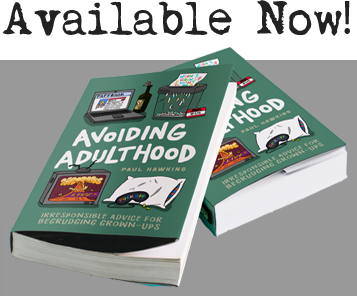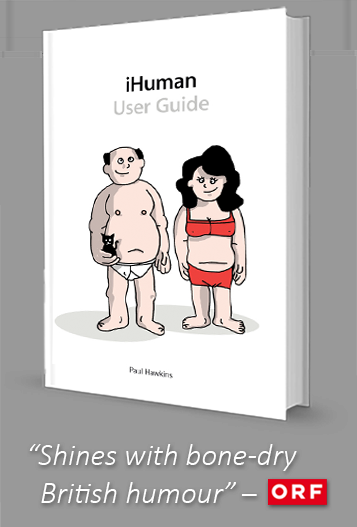
Page 32 (War, Coffee, and Nationalist Ham)
Back in January, on the morning of the 17th to be precise, I was hung-over and on my way home from some stupid night in London where I had almost certainly treated my primary bodily organs with all the care of someone who didn’t plan to continue using them. With the morning’s rush-hour commuters heading decidedly in the opposite direction of fun, I slumped down on the train and picked up a discarded copy of the Metro, a free city newspaper primarily published so people have something to point their bleak work-haunted faces at instead of each other.
I browsed lazily to find out what the Daily Mail media conglomerate believed me and every other literate Londoner needed to know about the planet’s adventures since the morning before.

Two people you’re definitely not encouraged to judge immediately as freaks
‘We have 28 rats – and we love ’em,’ reads the first headline over the page, underneath a photo of an unsmiling couple with a dozen pet rodents crawling on them, an oddity you’d probably notice quickly if it wasn’t for the massive and quite frankly hypnotic bogie suspended so proudly in her nostril.
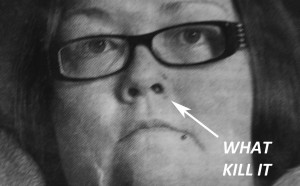
After I eventually managed to pull my eyes away from the lady’s baffling inattention to things inside her face that she probably didn’t want published, I meandered through a few more pages.
Headline highlights included:
‘Pickles admits ‘gentle’ battle,’ a small story about a Tory politician called Eric Pickles who did something or other that nobody cares about because he is called Eric Pickles and look exactly like this:

No one made him choose a career that required a tight collar, remember
‘Kelly sex op shock,’ page 7, where ‘it has emerged,’ apparently, that Kelly Osborne’s former fiancé cheated on her with a transsexual, although it might as well have been an exhaust pipe or a rolled-up receipt or a damp cabbage going by his obviously crippled sense of judgement;
‘A whiff of Neverland puts the eau in Jacko,’ a title so baffling it makes the attached article on page 25 about an illegal immigrant selling perfume made from a deceased man’s flowers look absolutely fucking sensible; and, finally,
‘British Bruce Lee makes it in China,’ where Ross McGuinness, who is clearly a genius for convincing at least one person in the world he’s a journalist, begins his piece on page 29 with, ‘IF THE British had made a version of Enter the Dragon, it might have turned out a little like this,’ before going on to explain how the actual events that he’s waffling about –a man from Brighton judging martial arts students aged seven to seventy performing solo routines—are so far unlike that film that he might as well have begun his article with ‘IF BRUCE Lee’s spirit possessed a cracker…’ then waffled on about some blissful, alternative reality where people called Ross McGuiness aren’t allowed within 10 metres of a keyboard.
Finally, I reached Page 32, the first half of a double-page spread that affected me enough at the time to save the entire newspaper, place it in a drawer in my desk, and ignore it until some elusive, future time when I would locate it again and write what I might have written then if I didn’t have so much flat booze sloshing around my guts.
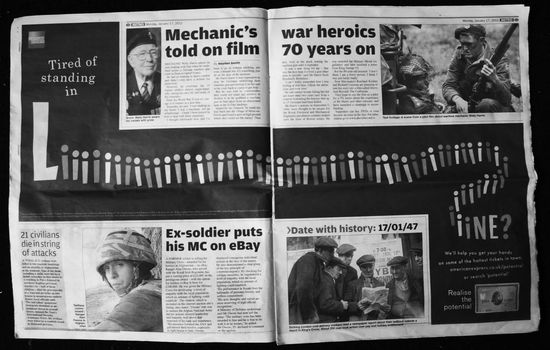
Tired of standing in line? Join the Army!
Where page 32 was different from the rest of the newspaper, it seemed to me, was that it contained a small piece of text in the bottom-left corner, squashed beneath a massive advert for a credit card and two articles glorifying British soldiers for their past ‘bravery,’ that was actual news, here in fun-ending full:
21 civilians die in string of attacks A TOTAL of 21 civilians were killed in two roadside bombings and an airstrike in Afghanistan at the weekend. Nine of the dead, including a child, were hit by a bomb yesterday as they drove to a wedding in Pul-e-Khumri in northern Baghlan province. Another six – half of them children – died the previous day in a Nato-led airstrike on two houses in mountainous eastern Kunar; local officials said. The raid killed ‘numerous’ insurgents identified as an imminent threat to ground forces, claimed the Nato’s International Security Assistance Force. Six civilians were killed by a roadside bomb in Helmand Province.
It was amongst the smallest pieces in the paper, yet it seemed to me to contain the most tragic of events. Why was it not a big story? Why was it not the biggest story? They were on their way to a wedding. Are we so desensitised to war and violence that this just wasn’t deemed interesting enough? Are we so far away from the consequences of our militaries that we just don’t care? Are we just so beaten down by the relentless stream of similar stories that we are too numb and passive to react? I don’t know.
What is perhaps more enlightening than the apparent insignificance of the death of 21 civilians — including the three children killed by the entirely unaccountable Nato military force – though, is the context of the article within the Paper.
The top article, ‘Mechanic’s war heroics told on film 70 years on,’ tells the story of Wally Harris, a veteran of the Second World War, who shot and killed up to 15 German soldiers in an action the Paper and the filmmakers describe as ‘heroic,’ but which he himself describes as “terrifying” and “daft.”
Further down the page, but no difference in its baseline patriotic tone, is a second article, ‘Ex-soldier puts his MC on eBay,’ a story about the former infantryman Alan Owens who was awarded the Military Cross medal for his “bravery and selfless commitment” in Afghanistan, then auctioned his small piece of literally useless metal on eBay with a cheeky starting price of £25,000.
The connection between these two men, though their actions were separated by 70 blooming baby-booming years, is that they are both British and, therefore, the good guys.
As we digest the information that 21 civilians – real people, like us – were blown to pieces by the same eternal good guys in a region thousands of miles away from the governments that sanctioned their deaths, we are equally expected to regard other soldiers who blindly followed orders as the inherently bravest and most heroic of our citizens.
It’s bullshit.
We don’t need to learn much new to realise it, either, just un-learn some of the silly whizz that we might have never scrutinised. And, if you’ll bear with me for a minute, I promise after to explain how this entire massive rant was the product of me drinking too much coffee, then getting annoyed at a packet of ham.
Humanity is a species whose work you’re probably familiar with. Lightbulbs, picnics, hinges, et cetera. There’s close to 7,000,000,000 of them at the moment, all alike except for culture and how they do their hair, and they’ve been divided crudely but apparently convincingly into about 250 major clubs that I refer to, perhaps far too aware of my own ironic tone, as ‘countries.’ Anthems, wars, netball teams – you’ve seen them.
However, these ‘countries,’ through the unattended practice of having political leaders, hierarchical institutions and governments, could also be described as sharing a creepy amount of overlap with the phrase tax farms. They require things like walls, fences, borders, militaries, passports and ID cards to envelope an effectively non-consensual group of similar-ish people — ‘citizens’ we’ll call them — within their borders from whom they can forcibly extract a product: in this case, money. Borders aren’t so much gatehouses to keep ‘them’ out, whoever those pesky problem people are, but more like the pen that keeps ‘us’ in.
Each club, or ‘country,’ has its own leader, or small groups of leaders, who, after attacking, tricking or convincing their ‘citizens,’ are protected in this role by the very guns and bombs and armies that they sometimes use to wrestle resources from each other, which they have done throughout history, and still try to do as today, which is completely obvious to any one who is not otherwise living inside a discarded, road-side fridge. Meanwhile, these violent, greedy and silly acts of war are committed at the direct expense of soldiers, and funded by the very tax-payers that they claim to represent the interests of. Tax-payers, incidentally, that if asked, would presumably insist on preferring better roads, teachers, nurses and water cannons for spraying fires and young people, than a trail of dead, brown people somewhere bloody foreign.
The ‘them and us’ has never been ‘our’ people and people from different countries, no matter how much we have always been actively encouraged in to that mode of thinking (The French! The Nazis! The Communists! The Immigrants! The Terrorists!)
The idea that there is an ‘us’ at all is perhaps the biggest and most constant lie told in all of politics.
Farms and Farmers
It is also not hard to see what a farmer could want to take from another farmer, and inherent in that shit, nursery-level sentence is the basic truth behind most wars since the beginning of these formalised cults we call countries. It’s probably more accurate to say that the ‘them and us’ has more commonly been the people of the world and those who rule them; those owned, brainwashed and forced to kill each other, or fund it with stolen chunks of their pay-checks, and the people who are in control of that system. You cannot have violence abroad without first having violence at home. You cannot point guns at foreign citizens without first pointing them at yours.
If all this is making me sound like a hippy-lefty-liberal-something-conspiracy-sensationalist-bloggy-twat-sort-of-a-man, here’s a deservedly famous and grimly illuminating quote from one of modern history’s particularly bastardiest bastards Hermann Göring, the Nazi general who had one of the safer jobs in the long and unpleasant series of events we call World War II.
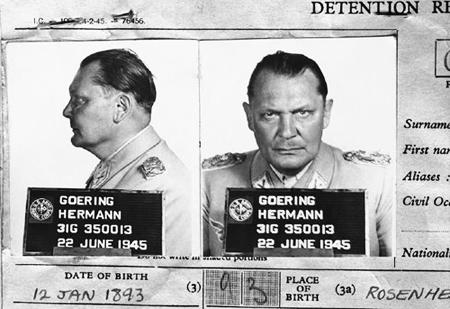
… which is weird, because he looks so nice
Just before he picked up prizes in both the War Crimes and Crimes Against Humanity categories of the Nuremburg Awards Ceremony, and before he killed himself with smuggled cyanide the night before his death sentence (obviously), Göring immortalised his hopefully untrumpable bastardishness in a prison-cell interview:
Why, of course, the people don’t want war […] Why would some poor slob on a farm want to risk his life in a war when the best that he can get out of it is to come back to his farm in one piece? Naturally the common people don’t want war; neither in Russia, nor in England, nor in America, nor in Germany. That is understood. But after all, it is the leaders of the country who determine policy, and it is always a simple matter to drag the people along, whether it is a democracy, or a fascist dictatorship, or a parliament, or a communist dictatorship. Voice or no voice, the people can always be brought to the bidding of the leaders. That is easy. All you have to do is to tell them they are being attacked, and denounce the pacifists for lack of patriotism and exposing the country to danger. It works the same in any country.
Little has changed in this fundamental dynamic. There is something important to untangle here in the idea of British soldiers fighting Iraqi or Taliban soldiers, for example. Thousands upon thousands of men weren’t sitting around either side of a continent, twiddling their trigger-finger-thumbs, and getting increasingly hateful towards another group of people that they’d never met or thought about before.
No. It is the British (Replace As Appropriate) government fighting its ‘enemies,’ and ‘our troops’ are merely the currency of exchange used to achieve whatever desirable political ends are being sought. This could be any of the usual candidates, depending on where you lie on the continuum of idealism/cynicism: Regime change, oil, contracts, strategic military footholds, revenge, whatever. It doesn’t really matter when we – the common people, the poor slobs on our farms – will buy any old twonk about terrorists hating our freedom, non-interventionists being ‘terrorist-sympathisers,’ or Weapons of Mass Destruction (remember them?) being pointed directly at our local pub.
We might be a bit naive to believe that governments ultimately care the most about soldiers’ individual lives. Soldiers are not individual people to these warmongering arseholes — they’re pawns in a real-life game of chess. They’re dispensable. Statistics – a regiment (1000?), a division (5000?), a brigade (10,000?). And the saddest thing to me is that soldiers will keep being used as tools and meat weapons because we keep pushing them into harm’s way with our dreadful, hysterical fucking nonsense.
Help for Heroes! Support our boys! Respect the troops!
Hell, if you’ve stayed with me through all that heavily-caffeinated ranting, you deserve to know that the reason I remembered to write this thing at all today was that I went to the fridge to make a sandwich, and saw written on a packet of ham, ‘SUPPORT OUR UK FORCES PURCHASE THIS HAM.’ Incidentally, this pork product that was purchased for its primary function of being ham, rather than its minor contribution to a pervasive culture in our society of glorifying those who might be the most heinously misused by it.
Slices of deceased pig, quite simply, should not be encouraging you to support soldiers, whatever ‘team’ they are on. In fact, I’d prefer my ham to have very few political opinions at all.
So next time you see an article in a newspaper and it pulls out one particular dead soldier’s name (and, inevitably, neglects to mention the many, non-allied civilians who died that same day), praises him or her as a hero, no questions asked, and then tells you they were brave for dying to protect you and your freedom — remember also the sadder flip-side of this event.
They did not die to “protect you.” They died because they were paid to, as they were ordered into that known danger. Their glory, their fame, their front-page obituary, is completely tragic, temporary and fleeting; yet no more-or-less than tomorrow’s fish-and-chip paper in some Greater Plan. It’s a nudge in your ribs to keep you believing what you should.
To keep supporting soldiers.
To keep supporting war.
To keep supporting ham.
That soldier’s extinguished life, the lives they probably took as well, and the grieving relatives either side of the gun they were paid and ordered to carry –all that loss and suffering– will be hard, perhaps impossible, to measure in gains to your freedom or safety, but easier to measure in the career trajectories and bank accounts of the military-industrial complex, oil companies, politicians, lobbyists, contractors, mercenaries, capitalists, industrialists and pork peddlers – nobody who can legitimately claim to care about them or you, unless it aligns with their own motives first.
When you religiously glorify soldiers, praise them, worship them, or martyr them, you become a small, unwilling part of the social machine that sends them to war — one hand amongst many that pushes them towards danger and death.
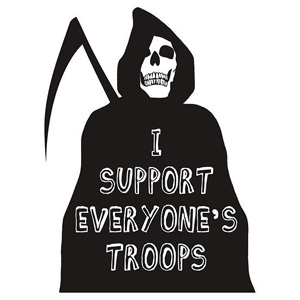
Oh, Death, you wacky liberal
The whole myth falls apart when we attempt the difficult task of trying to value every human life equally. When you realise that EVERY SOLDIER on EVERY SIDE does WHAT THEY ARE TOLD and BELIEVES THEY ARE RIGHT, suddenly it doesn’t seem so fun to keep sorting them in to lines, pointing them at each other, and whispering into their ears what the other lot said about their mothers and a courgette.
When a war is ‘won’, and you won’t see much of that any time soon, what has really won is the idea that war can solve problems. That complex, intricate matters like drug trafficking or border disputes or religious fanaticism can be solved by splitting into teams and slinging a stubborn amount of violence, expensive weaponry, cash and ignorant rage at each other.
Yes, kids, adults solve problems by trying to explode them; adults solve problems by shredding up each other’s internal organs with terrifying metal projectiles.
The cause of war
In fact, the preliminary, prerequisite cause of most wars is statism – the existence of states and nations – and the division of people into these old, ever-shifting, imaginary-bordered clubs by their owners. If you defend the state as a noble solution to social issues like education and road-building and healthcare, it’s unfortunate that you must also carry around the baggage of state on state conflict. You find yourself wearing the millstone of the millions of deaths caused directly by their very existence; 40 million people in the First World War, over 60 million in Part Two, millions and millions more before, in-between and after due to the clashing ideologies and intentions of all those in power with the means to mobilise the world’s poor against each other with violence and financial incentives. Add to this history’s conquests, genocides, revolutions, civil wars, terrorism, government-caused ghettos and famines, and it suddenly becomes very difficult to make the case that states and their agents are definitely the best possible conceivable way humans can come up with to protect you.
Historically, the encouraged mentality of blind patiotism –and that’s a lot of what a state really is — a firmly-rooted and heavily-propagandised idea in our collective consciousness — has almost always been the biggest threat to your life and your livelihood that exists. Indeed, as you are forced to pay your taxes (with the threat of punishments), governments can auction your future earnings in the form of debt, you’re threatened with imprisonment if you break a myriad of rules you have almost no control over, as the state has a practical monopoly on the use of violence, can theoretically draft you into the military whenever it wants, uses propaganda to achieve its political ends, and will always, always protect its existence over yours, it’s difficult to argue that ‘your country’ is anything but the absolute enemy of your freedom. While it might protect you from other countries, it might not protect you from itself.
That’s why blind patriotism is so consistently encouraged by those in power.
A very lucrative myth would crumble without it. There’s no conspiracy here either – it’s just a clumsily set-up world that we live in. It’s a flimsy, patched-up bodge job which we’ve all inherited from bloodthirsty monarchs, dogma-ridden institutions, warmongering factions, superstitious know-nothings, and ignorant, echoing relics of the Dark Ages.
We’re actively taught and encouraged to worship ‘our’ soldiers, to believe that simply by being a soldier, regardless of any individual characteristics (like, oh I don’t know, your personality) makes one good and brave and heroic. We are further encouraged to maintain the long-established nonsense of past murdered men having “died for our freedom,” like they had any choice in the matter (by which I mean, a better choice than “Go to War or go to Prison: which would you prefer today, sir?”), rather than the enforced protection or expansion of borders and tax-bases, in opposition to the other entities protecting or expanding theirs.
To criticise this herd mentality, to remark on this zealous, foolish ‘national’ limit to our empathy, or to even open a discussion to the idea that soldiers aren’t automatically amazing and brilliant and admirable – some of them are definitely just massive dicks – is to be accused of being unpatriotic, treacherous, unappreciative or ridiculous. It is the most powerful and perverse of social stigmas that those who care the most can so easily be accused of caring the least.
That is, perhaps, how four murdered children end up as a small note in a little grey box on page 32.

Countries – A Problem Earth Doesn’t Need (Hencewise.com)
U.S. Soldier Ethan McCord talks about his time in Iraq. A hard-to-watch but important video. Informative and tragic.








